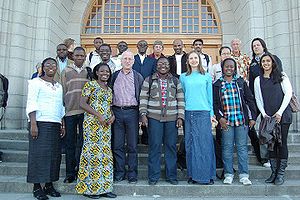Difference between revisions of "User:Mercy Motte"
Mercy Motte (Talk | contribs) |
Mercy Motte (Talk | contribs) |
||
| (4 intermediate revisions by 2 users not shown) | |||
| Line 1: | Line 1: | ||
| − | [[File:W3.jpg|thumb|300px|fourth right, first row]] | + | [[File:Snapshot 20110224 1.JPG|thumb|200px|left| in action]] |
| + | [[File:W3.jpg|thumb|300px|fourth right, first row]] | ||
| − | My name is Mercy Motte | + | My name is Mercy Motte and I was graduate Linguistics student at NTNU, Trondheim, Norway. I did my Bachelor's degree in Linguistics at the University of Ghana which i completed in 2005.I am interested in languages and so will like to do some research into endagered languages. I come from Sovie Tsudzi not too big a village in the Kpando District of the volta region of Ghana. My mother tongue is Ewe. Other languages i speak fluently and also can read and write include Akan, Ga and English. I also have a strong passion to teach Linguistics when the opportunity pops up and also go into linguistic research. |
Ewe is one of the clusters of languages under Gbe. Gbe has Ewe, Fon and Aja. Ewe is spoken in the Southeastern parts of Ghana and southern Togo. According to research, currently, there are about 2.5 to 3 million speakers of Ewe. | Ewe is one of the clusters of languages under Gbe. Gbe has Ewe, Fon and Aja. Ewe is spoken in the Southeastern parts of Ghana and southern Togo. According to research, currently, there are about 2.5 to 3 million speakers of Ewe. | ||
| − | '''PROJECTS I | + | '''PROJECTS I HAVE LOOKED AT AND FUTURE WORK''' |
| − | + | My thesis was in phonology - VOWEL HIATUS IN EWE. The work looked at how the language resolves the problem of the cluster of two vowels without an intervening consonant. These two vowels belong to two different syllables. The finding was that the language prefers to delete one of the two vowels. | |
| − | + | In the future, I would like to look at the Ewe Focus Marker \e\. My reason is to critically unearth the phonological reason(s) for the choice of the vowel \e\ which bears a high tone and not any of the other vowels the language has. some questions i keep asking myself include, Are there reasons such as vowel harmony, obligatory contour principle or the choice is simply random or arbitrary. A lot of the work on focus in Ewe is purely descriptive. For instance, stating and describing their positions in syntactic structures. I will want to find reasons for the choice in the first place. | |
| + | |||
| + | On tones, i will also be interested in examining the results when tones interact in a prosodic word. The word could be a single word or a compound word. Are there cases of elision, assimilation and are there evidences for these phenomena. | ||
For pragmatics, i may look at some aspects of the Ewe deictic system with reference to Levinson's theory on deixis. It is believed that deixis is one core area of language yet very little studies have been done on it for Ewe. This is one main area i may venture into. | For pragmatics, i may look at some aspects of the Ewe deictic system with reference to Levinson's theory on deixis. It is believed that deixis is one core area of language yet very little studies have been done on it for Ewe. This is one main area i may venture into. | ||
| Line 19: | Line 22: | ||
i love linguistics! | i love linguistics! | ||
--[[User:Mercy Motte|Mercy Motte]] 09:02, 26 January 2011 (UTC) | --[[User:Mercy Motte|Mercy Motte]] 09:02, 26 January 2011 (UTC) | ||
| − | Contact Email | + | Contact Email mercymotte@yahoo.com |
Latest revision as of 05:09, 17 April 2014
My name is Mercy Motte and I was graduate Linguistics student at NTNU, Trondheim, Norway. I did my Bachelor's degree in Linguistics at the University of Ghana which i completed in 2005.I am interested in languages and so will like to do some research into endagered languages. I come from Sovie Tsudzi not too big a village in the Kpando District of the volta region of Ghana. My mother tongue is Ewe. Other languages i speak fluently and also can read and write include Akan, Ga and English. I also have a strong passion to teach Linguistics when the opportunity pops up and also go into linguistic research.
Ewe is one of the clusters of languages under Gbe. Gbe has Ewe, Fon and Aja. Ewe is spoken in the Southeastern parts of Ghana and southern Togo. According to research, currently, there are about 2.5 to 3 million speakers of Ewe.
PROJECTS I HAVE LOOKED AT AND FUTURE WORK
My thesis was in phonology - VOWEL HIATUS IN EWE. The work looked at how the language resolves the problem of the cluster of two vowels without an intervening consonant. These two vowels belong to two different syllables. The finding was that the language prefers to delete one of the two vowels.
In the future, I would like to look at the Ewe Focus Marker \e\. My reason is to critically unearth the phonological reason(s) for the choice of the vowel \e\ which bears a high tone and not any of the other vowels the language has. some questions i keep asking myself include, Are there reasons such as vowel harmony, obligatory contour principle or the choice is simply random or arbitrary. A lot of the work on focus in Ewe is purely descriptive. For instance, stating and describing their positions in syntactic structures. I will want to find reasons for the choice in the first place.
On tones, i will also be interested in examining the results when tones interact in a prosodic word. The word could be a single word or a compound word. Are there cases of elision, assimilation and are there evidences for these phenomena.
For pragmatics, i may look at some aspects of the Ewe deictic system with reference to Levinson's theory on deixis. It is believed that deixis is one core area of language yet very little studies have been done on it for Ewe. This is one main area i may venture into.
Syntax interests me too. Watch out for a project i will come up with.
Do you mind being in my camp?
i love linguistics! --Mercy Motte 09:02, 26 January 2011 (UTC) Contact Email mercymotte@yahoo.com

